实验2 类和对象_基础编程1
实验任务一
代码
t.h
1 #pragma once
2
3 #include <string>
4
5 // 类T: 声明
6 class T {
7 // 对象属性、方法
8 public:
9 T(int x = 0, int y = 0); // 普通构造函数
10 T(const T &t); // 复制构造函数
11 T(T &&t); // 移动构造函数
12 ~T(); // 析构函数
13
14 void adjust(int ratio); // 按系数成倍调整数据
15 void display() const; // 以(m1, m2)形式显示T类对象信息
16
17 private:
18 int m1, m2;
19
20 // 类属性、方法
21 public:
22 static int get_cnt(); // 显示当前T类对象总数
23
24 public:
25 static const std::string doc; // 类T的描述信息
26 static const int max_cnt; // 类T对象上限
27
28 private:
29 static int cnt; // 当前T类对象数目
30
31 // 类T友元函数声明
32 friend void func();
33 };
34
35 // 普通函数声明
36 void func();
t.cpp
1 // 类T: 实现
2 // 普通函数实现
3
4 #include "t.h"
5 #include <iostream>
6 #include <string>
7
8 using std::cout;
9 using std::endl;
10 using std::string;
11
12 // static成员数据类外初始化
13 const std::string T::doc{"a simple class sample"};
14 const int T::max_cnt = 999;
15 int T::cnt = 0;
16
17
18 // 对象方法
19 T::T(int x, int y): m1{x}, m2{y} {
20 ++cnt;
21 cout << "T constructor called.\n";
22 }
23
24 T::T(const T &t): m1{t.m1}, m2{t.m2} {
25 ++cnt;
26 cout << "T copy constructor called.\n";
27 }
28
29 T::T(T &&t): m1{t.m1}, m2{t.m2} {
30 ++cnt;
31 cout << "T move constructor called.\n";
32 }
33
34 T::~T() {
35 --cnt;
36 cout << "T destructor called.\n";
37 }
38
39 void T::adjust(int ratio) {
40 m1 *= ratio;
41 m2 *= ratio;
42 }
43
44 void T::display() const {
45 cout << "(" << m1 << ", " << m2 << ")" ;
46 }
47
48 // 类方法
49 int T::get_cnt() {
50 return cnt;
51 }
52
53 // 友元
54 void func() {
55 T t5(42);
56 t5.m2 = 2049;
57 cout << "t5 = "; t5.display(); cout << endl;
58 }
task1.cpp
#include "t.h"
#include <iostream>
using std::cout;
using std::endl;
void test();
int main() {
test();
cout << "\nmain: \n";
cout << "T objects'current count: " << T::get_cnt() << endl;
}
void test() {
cout << "test class T: \n";
cout << "T info: " << T::doc << endl;
cout << "T objects'max count: " << T::max_cnt << endl;
cout << "T objects'current count: " << T::get_cnt() << endl << endl;
T t1;
cout << "t1 = "; t1.display(); cout << endl;
T t2(3, 4);
cout << "t2 = "; t2.display(); cout << endl;
T t3(t2);
t3.adjust(2);
cout << "t3 = "; t3.display(); cout << endl;
T t4(std::move(t2));
cout << "t3 = "; t4.display(); cout << endl;
cout << "T objects'current count: " << T::get_cnt() << endl;
func();
}
编译结果
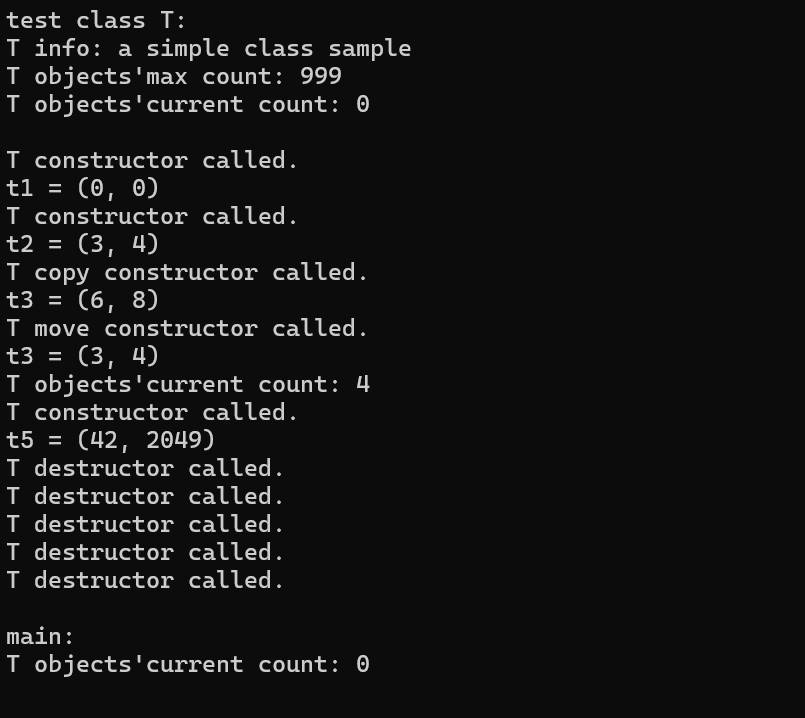
问题1
不能正确运行。如果去掉 t.h 中的友元声明 friend void func();,程序将无法正确编译。原因是 func() 函数需要访问 T 类的私有成员变量 m2,如果没有友元关系,func() 将无法访问 T 类的私有成员,导致编译错误。
问题2
T 类的构造函数和析构函数如下:
-
普通构造函数 T(int x = 0, int y = 0);
功能:创建一个 T 类的对象,允许用户指定成员变量 m1 和 m2 的初始值,默认为 0。
调用时机:当使用默认参数或提供具体参数创建对象时,如 T t1; 或 T t2(3, 4);。
复制构造函数 T(const T &t);
功能:通过已有的 T 类对象来初始化新的对象,实现成员变量的拷贝。
调用时机:当以现有对象初始化新对象时,如 T t3(t2);,或当对象以值传递方式作为函数参数或返回值时。
移动构造函数 T(T &&t);
功能:移动资源,而非复制,用于优化临时对象或右值的初始化,减少不必要的拷贝。
调用时机:当使用 std::move 转换为右值引用,或函数返回临时对象时,如 T t4(std::move(t2));。
析构函数 ~T();
功能:在对象生命周期结束时执行清理操作,如释放资源、更新静态计数器等。
调用时机:当对象超出其作用域、被显式删除或程序结束时,系统自动调用析构函数。
总结:
构造函数:用于初始化对象的成员变量,分配必要的资源。
析构函数:用于在对象销毁时释放资源,执行必要的清理工作。
问题3
不能正确编译运行。如果将静态成员变量的定义和初始化从 t.cpp 移动到 t.h,会导致链接错误,无法正确编译。
实验任务2
代码
complex.cpp
1 #include "Complex.h"
2
3 const std::string Complex::doc = "a simplified complex class";
4
5 Complex::Complex() : real(0.0), imag(0.0) {}
6
7 Complex::Complex(double real) : real(real), imag(0.0) {}
8
9 Complex::Complex(double real, double imag) : real(real), imag(imag) {}
10
11 Complex::Complex(const Complex& other) : real(other.real), imag(other.imag) {}
12
13 double Complex::get_real() const {
14 return real;
15 }
16
17 double Complex::get_imag() const {
18 return imag;
19 }
20
21 void Complex::add(const Complex& other) {
22 real += other.real;
23 imag += other.imag;
24 }
25
26 Complex add(const Complex& c1, const Complex& c2) {
27 return Complex(c1.real + c2.real, c1.imag + c2.imag);
28 }
29
30
31 bool is_equal(const Complex& c1, const Complex& c2) {
32 return (c1.real == c2.real) && (c1.imag == c2.imag);
33 }
34
35 bool is_not_equal(const Complex& c1, const Complex& c2) {
36 return !(is_equal(c1, c2));
37 }
38
39 void output(const Complex& c) {
40 std::cout << c.real << (c.imag >= 0 ? " + " : " - ") << std::abs(c.imag) << "i";
41 }
42
43 double abs(const Complex& c) {
44 return std::sqrt(c.real * c.real + c.imag * c.imag);
45 }
main.cpp
1 #include <iostream>
2 #include "Complex.h"
3
4 using std::cout;
5 using std::endl;
6 using std::boolalpha;
7
8 void test() {
9 cout << "类成员测试: " << endl;
10 cout << Complex::doc << endl;
11
12 cout << endl;
13
14 cout << "Complex对象测试: " << endl;
15 Complex c1;
16 Complex c2(3, -4);
17 const Complex c3(3.5);
18 Complex c4(c3);
19
20 cout << "c1 = "; output(c1); cout << endl;
21 cout << "c2 = "; output(c2); cout << endl;
22 cout << "c3 = "; output(c3); cout << endl;
23 cout << "c4 = "; output(c4); cout << endl;
24 cout << "c4.real = " << c4.get_real() << ", c4.imag = " << c4.get_imag() << endl;
25
26 cout << endl;
27
28 cout << "复数运算测试: " << endl;
29 cout << "abs(c2) = " << abs(c2) << endl;
30 c1.add(c2);
31 cout << "c1 += c2, c1 = "; output(c1); cout << endl;
32
33 cout << boolalpha;
34 cout << "c1 == c2 : " << is_equal(c1, c2) << endl;
35 cout << "c1 != c3 : " << is_not_equal(c1, c3) << endl;
36
37 c4 = add(c2, c3);
38 cout << "c4 = c2 + c3, c4 = "; output(c4); cout << endl;
39 }
40
41 int main() {
42 test();
43 return 0;
44 }
complex.h
1 #ifndef COMPLEX_H
2 #define COMPLEX_H
3
4 #include <iostream>
5 #include <cmath>
6
7 class Complex {
8 public:
9
10 static const std::string doc;
11
12 Complex();
13 Complex(double real);
14 Complex(double real, double imag);
15 Complex(const Complex& other);
16
17 double get_real() const;
18 double get_imag() const;
19 void add(const Complex& other);
20
21
22 friend Complex add(const Complex& c1, const Complex& c2);
23 friend bool is_equal(const Complex& c1, const Complex& c2);
24 friend bool is_not_equal(const Complex& c1, const Complex& c2);
25 friend void output(const Complex& c);
26 friend double abs(const Complex& c);
27
28 private:
29 double real;
30 double imag;
31 };
32
33 #endif
编译结果
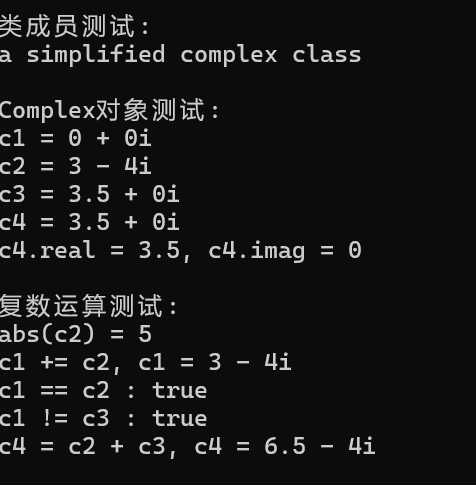
实验任务3
代码
1 #include <iostream>
2 #include <complex>
3
4 using std::cout;
5 using std::endl;
6 using std::boolalpha;
7 using std::complex;
8
9 void test() {
10 cout << "标准库模板类comple测试: " << endl;
11 complex<double> c1;
12 complex<double> c2(3, -4);
13 const complex<double> c3(3.5);
14 complex<double> c4(c3);
15
16 cout << "c1 = " << c1 << endl;
17 cout << "c2 = " << c2 << endl;
18 cout << "c3 = " << c3 << endl;
19 cout << "c4 = " << c4 << endl;
20 cout << "c4.real = " << c4.real() << ", c4.imag = " << c4.imag() << endl;
21 cout << endl;
22
23 cout << "复数运算测试: " << endl;
24 cout << "abs(c2) = " << abs(c2) << endl;
25 c1 += c2;
26 cout << "c1 += c2, c1 = " << c1 << endl;
27 cout << boolalpha;
28 cout << "c1 == c2 : " << (c1 == c2) << endl;
29 cout << "c1 != c3 : " << (c1 != c3) << endl;
30 c4 = c2 + c3;
31 cout << "c4 = c2 + c3, c4 = " << c4 << endl;
32 }
33
34 int main() {
35 test();
36 }
编译结果
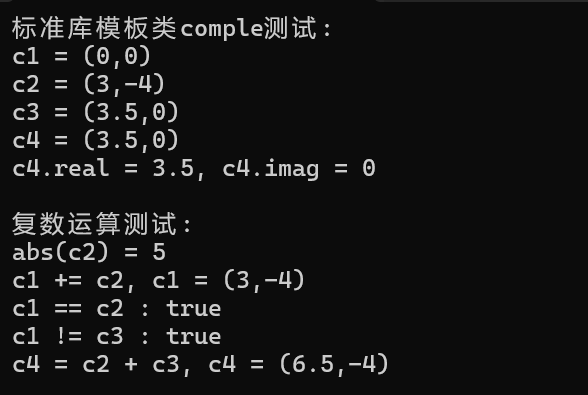
思考
构造函数:
默认构造函数:
-
complex<double> c1;
创建了一个默认的复数对象 c1,其实部和虚部均为 0。
带实部和虚部的构造函数:
complex<double> c2(3, -4);
创建了一个复数对象 c2,实部为 3,虚部为 -4。
仅带实部的构造函数:
const complex<double> c3(3.5);
创建了一个常量复数对象 c3,实部为 3.5,虚部为 0。
复制构造函数:
complex<double> c4(c3);
使用已有的复数对象 c3 初始化新的复数对象 c4。
成员函数:
获取实部和虚部:
c4.real(); c4.imag();
使用 real() 和 imag() 成员函数获取复数的实部和虚部。
算术运算符重载:
复数加法:
c1 += c2; c4 = c2 + c3;
使用了 operator+= 和 operator+ 进行复数的加法运算。
比较运算符重载:
相等和不等比较:
c1 == c2; c1 != c3;
使用了 operator== 和 operator!= 进行复数的比较。
非成员函数:
求复数的模(绝对值):
abs(c2);
使用标准库提供的 abs 函数计算复数的模。
输出运算符重载:
输出复数对象:
cout << c1;
使用了 operator<< 将复数对象直接输出到控制台面。
对比任务2:
1.代码简洁性:使用标准库complex 类,代码更加简洁,主要得益于运算符的重载,直接使用 +, +=, ==, != 等运算符,而不需要调用额外的函数。
输出方便: 标准库已经重载了输出运算符 <<,可以直接输出复数对象,而自定义类需要编写专门的 output 函数。
命名规范: 标准库的成员函数命名更为简洁,如 real() 和 imag(),相比自定义类的 get_real() 和 get_imag() 更为简练。
2.启发和思考:
运算符重载的重要性: 标准库 complex 类通过重载算术和比较运算符,使得复数的运算和比较变得直观且符合数学表达习惯。这提高了代码的可读性和可维护性。
友元函数 vs. 成员函数: 自定义的 Complex 类中,很多操作是通过友元函数实现的,而标准库 complex 类更多地使用成员函数和运算符重载。这提醒我们,在设计类时,可以充分利用成员函数和运算符重载,减少对友元函数的依赖。
输出运算符的重载: 标准库通过重载 << 运算符,直接支持复数对象的输出。自定义类可以借鉴这种设计,使得对象的输出更为方便。
实验任务4
代码
Fraction.h
1 #ifndef FRACTION_H
2 #define FRACTION_H
3
4 #include <string>
5
6 class Fraction {
7 public:
8 static const std::string doc;
9
10 // Constructors
11 Fraction(int up = 0, int down = 1);
12 Fraction(const Fraction &other);
13
14 // Interface methods
15 int get_up() const;
16 int get_down() const;
17 Fraction negative() const;
18
19 // Friend functions
20 friend void output(const Fraction &f);
21 friend Fraction add(const Fraction &f1, const Fraction &f2);
22 friend Fraction sub(const Fraction &f1, const Fraction &f2);
23 friend Fraction mul(const Fraction &f1, const Fraction &f2);
24 friend Fraction div(const Fraction &f1, const Fraction &f2);
25
26 private:
27 int up;
28 int down;
29
30 void reduce(); // Reduce the fraction to simplest terms
31 };
32
33 #endif // FRACTION_H
Fraction.cpp
1 #include "Fraction.h"
2 #include <iostream>
3 #include <cstdlib> // For exit()
4
5 using namespace std;
6
7 // Utility function to compute GCD (greatest common divisor)
8 static int gcd(int a, int b) {
9 return b == 0 ? a : gcd(b, a % b);
10 }
11
12 // Initialize the static const doc
13 const string Fraction::doc = "Fraction类 v 0.01版.\n目前仅支持分数对象的构造、输出、加/减/乘/除运算.";
14
15 // Constructors
16 Fraction::Fraction(int up, int down) : up(up), down(down) {
17 if (down == 0) {
18 cout << "Error: Denominator cannot be zero." << endl;
19 exit(1);
20 }
21 // Handle negative denominators
22 if (down < 0) {
23 this->up = -this->up;
24 this->down = -this->down;
25 }
26 reduce();
27 }
28
29 Fraction::Fraction(const Fraction &other) : up(other.up), down(other.down) {
30 // No need to reduce, as other should already be reduced
31 }
32
33 // Interface methods
34 int Fraction::get_up() const {
35 return up;
36 }
37
38 int Fraction::get_down() const {
39 return down;
40 }
41
42 Fraction Fraction::negative() const {
43 return Fraction(-up, down);
44 }
45
46 // Private method to reduce the fraction to simplest terms
47 void Fraction::reduce() {
48 int gcd_val = gcd(abs(up), abs(down));
49 if (gcd_val != 0) {
50 up /= gcd_val;
51 down /= gcd_val;
52 }
53 }
54
55 // Friend functions
56 void output(const Fraction &f) {
57 if (f.down == 1) {
58 cout << f.up;
59 } else {
60 cout << f.up << "/" << f.down;
61 }
62 }
63
64 Fraction add(const Fraction &f1, const Fraction &f2) {
65 int numerator = f1.up * f2.down + f2.up * f1.down;
66 int denominator = f1.down * f2.down;
67 return Fraction(numerator, denominator);
68 }
69
70 Fraction sub(const Fraction &f1, const Fraction &f2) {
71 int numerator = f1.up * f2.down - f2.up * f1.down;
72 int denominator = f1.down * f2.down;
73 return Fraction(numerator, denominator);
74 }
75
76 Fraction mul(const Fraction &f1, const Fraction &f2) {
77 int numerator = f1.up * f2.up;
78 int denominator = f1.down * f2.down;
79 return Fraction(numerator, denominator);
80 }
81
82 Fraction div(const Fraction &f1, const Fraction &f2) {
83 if (f2.up == 0) {
84 cout << "Error: Division by zero." << endl;
85 exit(1);
86 }
87 int numerator = f1.up * f2.down;
88 int denominator = f1.down * f2.up;
89 if (denominator < 0) {
90 numerator = -numerator;
91 denominator = -denominator;
92 }
93 return Fraction(numerator, denominator);
94 }
task4.cpp
1 #include "Fraction.h"
2 #include <iostream>
3
4 using std::cout;
5 using std::endl;
6
7 void test1() {
8 cout << "Fraction类测试: " << endl;
9 cout << Fraction::doc << endl << endl;
10
11 Fraction f1(5);
12 Fraction f2(3, -4), f3(-18, 12);
13 Fraction f4(f3);
14 cout << "f1 = "; output(f1); cout << endl;
15 cout << "f2 = "; output(f2); cout << endl;
16 cout << "f3 = "; output(f3); cout << endl;
17 cout << "f4 = "; output(f4); cout << endl;
18 Fraction f5(f4.negative());
19 cout << "f5 = "; output(f5); cout << endl;
20 cout << "f5.get_up() = " << f5.get_up() << ", f5.get_down() = " << f5.get_down() << endl;
21 cout << "f1 + f2 = "; output(add(f1, f2)); cout << endl;
22 cout << "f1 - f2 = "; output(sub(f1, f2)); cout << endl;
23 cout << "f1 * f2 = "; output(mul(f1, f2)); cout << endl;
24 cout << "f1 / f2 = "; output(div(f1, f2)); cout << endl;
25 cout << "f4 + f5 = "; output(add(f4, f5)); cout << endl;
26 }
27
28 void test2() {
29 Fraction f6(42, 55), f7(0, 3);
30 cout << "f6 = "; output(f6); cout << endl;
31 cout << "f7 = "; output(f7); cout << endl;
32 cout << "f6 / f7 = "; output(div(f6, f7)); cout << endl;
33 }
34
35 int main() {
36 cout << "测试1: Fraction类基础功能测试\n";
37 test1();
38 cout << "\n测试2: 分母为0测试: \n";
39 test2();
40 return 0;
41 }
编译结果
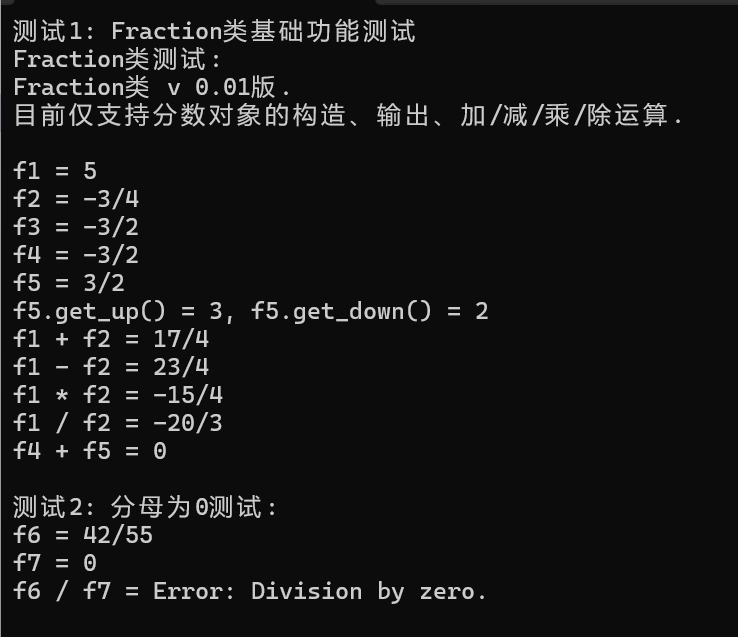
实验任务5
代码
account.cpp
1 #include <bits/stdc++.h>
2 #include "account.h"
3 using namespace std;
4
5 double SavingAccount::total=0;
6 SavingAccount::SavingAccount(int data,int id,double rate)
7 :id(id),balance(0),rate(rate),lastData(data),accumulation(0)
8 {
9 cout<<data<<"\t#"<<id<<"is created"<<endl;
10 }
11
12 void SavingAccount::record(int data,double amount)
13 {
14 accumulation=accumulate(data);
15 lastData=data;
16 amount=floor(amount*100+0.5)/100;
17 balance+=amount;
18 total+=amount;
19 cout<<data<<"\t#"<<id<<"\t"<<amount<<"\t"<<balance<<endl;
20 }
21
22 void SavingAccount::deposit(int data,double amount)
23 {
24 record(data,amount);
25 }
26
27 void SavingAccount::withdraw(int data,double amount)
28 {
29 if (amount>getBalance())
30 cout<<"Error:not enough money"<<endl;
31 else
32 record(data,-amount);
33 }
34
35 void SavingAccount::settle(int data)
36 {
37 double interest=accumulate(data)*rate/365;
38 if (interest!=0)
39 record(data,interest);
40 accumulation=0;
41 }
42 void SavingAccount::show() const
43 {
44 cout<<"#"<<id<<"\tBalance:"<<balance;
45 }
account.h
1 #ifndef __ACCOUNT_H__
2 #define __ACCOUNT_H__
3
4 class SavingAccount{
5 private:
6 int id;
7 double balance;
8 double rate;
9 double lastData;
10 double accumulation;
11
12 static double total;
13
14 void record(int data,double amount);
15 double accumulate(int data) const
16 {
17 return accumulation+balance*(data-lastData);
18 }
19 public:
20 SavingAccount(int data,int id,double rate);
21 int getId() const {return id;}
22 double getBalance() const {return balance;}
23 double getRate() const {return rate;}
24 static double getTotal() {return total;}
25 void deposit(int data,double amount);
26 void withdraw(int data,double amount);
27 void settle(int data);
28 void show() const;
29 };
30 #endif
task5.cpp
1 #include "account.h"
2 #include <iostream>
3 using namespace std;
4
5 int main ()
6 {
7 SavingAccount sa0(1,21325302,0.015);
8 SavingAccount sa1(1,58320212,0.015);
9
10 sa0.deposit(5,5000);
11 sa1.deposit(25,10000);
12 sa0.deposit(45,5500);
13 sa1.deposit(60,4000);
14
15 sa0.settle(90);
16 sa1.settle(90);
17
18 sa0.show();cout<<endl;
19 sa1.show();cout<<endl;
20 cout<<"Total:"<<SavingAccount::getTotal()<<endl;
21 return 0;
22 }
编译结果
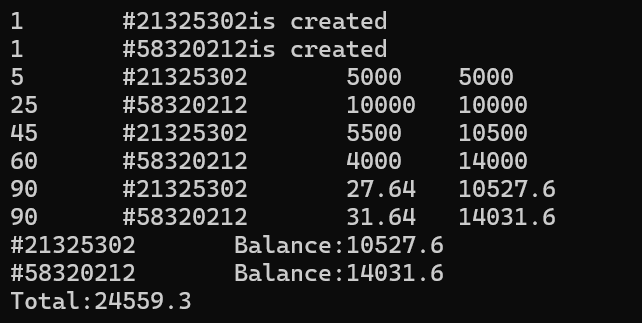
改进
接口设计和数据封装
公共方法和数据访问:
方法命名:方法 settle 可以更具描述性,例如改为 calculateInterest 或 applyInterest,以清晰表示其用途。
常量成员函数:确保所有不修改成员变量的方法都被声明为 const,这有助于提高代码的可读性和安全性。
访问控制:所有数据成员都是私有的,这很好地实现了封装。



